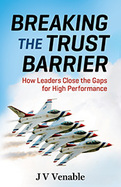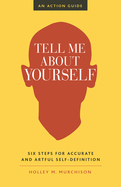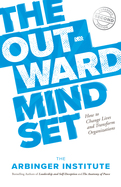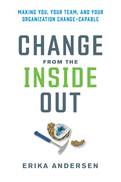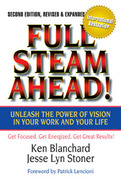Search Results: "employee development"
Results 721-726 of 746
Build Extraordinary Trust and Lead Your Team to a Higher Plane
For former US Air Force Thunderbirds' commander and demonstration leader JV Venable, inspiring teamwork was literally a matter of life and death. On maneuvers like the one pictured on the cover, the distance between jets was just eighteen inches. Closing the gaps to sustain that kind of separation requires the highest levels of trust.
On the ground or in the air, from line supervisor to CEO, we all face the same challenge. Our job is to entice those we lead to close the gaps that slow the whole team down—gaps in commitment, loyalty, and trust. Every bit of closure requires your people to let go of biases and mental safeguards that hold them back. The process the Thunderbirds use to break that barrier and craft the highest levels of trust on a team with an annual turnover of 50 percent is nothing short of phenomenal. That process is packaged here with tips and compelling stories that will help you build the team of a lifetime.
For former US Air Force Thunderbirds' commander and demonstration leader JV Venable, inspiring teamwork was literally a matter of life and death. On maneuvers like the one pictured on the cover, the distance between jets was just eighteen inches. Closing the gaps to sustain that kind of separation requires the highest levels of trust.
On the ground or in the air, from line supervisor to CEO, we all face the same challenge. Our job is to entice those we lead to close the gaps that slow the whole team down—gaps in commitment, loyalty, and trust. Every bit of closure requires your people to let go of biases and mental safeguards that hold them back. The process the Thunderbirds use to break that barrier and craft the highest levels of trust on a team with an annual turnover of 50 percent is nothing short of phenomenal. That process is packaged here with tips and compelling stories that will help you build the team of a lifetime.
Own Your Story
Sometimes you get only one chance. A good introduction can create connections and open doors. A bad one can make conversation fizzle and opportunities fade. What you need is a story that tells who you are—authentically, compellingly, and concisely—and can be adapted to fit any situation. Created for dynamic beings constantly redefining themselves, their work, and the world around them, Tell Me About Yourself pairs interviews and case studies with a simple, scalable framework, helping you craft and deliver comprehensive, compelling, and generally kick-ass introductions and personal stories for yourself, your team, or your company. In an ever-changing innovation economy and a climate that demands we put our best foot forward to create change, there's no better time to learn how to articulate your usefulness to the world.
Sometimes you get only one chance. A good introduction can create connections and open doors. A bad one can make conversation fizzle and opportunities fade. What you need is a story that tells who you are—authentically, compellingly, and concisely—and can be adapted to fit any situation. Created for dynamic beings constantly redefining themselves, their work, and the world around them, Tell Me About Yourself pairs interviews and case studies with a simple, scalable framework, helping you craft and deliver comprehensive, compelling, and generally kick-ass introductions and personal stories for yourself, your team, or your company. In an ever-changing innovation economy and a climate that demands we put our best foot forward to create change, there's no better time to learn how to articulate your usefulness to the world.
Citizen Capitalism
2019
Corporations have a huge influence on the life of every citizen—this book offers a visionary but practical plan to give every citizen a say in how corporations are run while also gaining some supplemental income. It lays out a clear approach that uses the mechanisms of the private market to hold corporations accountable to the public.
This would happen through the creation of what the authors call the Universal Fund, a kind of national, democratic, mega mutual fund. Every American over eighteen would be entitled to a share and would participate in directing its share voting choices. Corporations and wealthy individuals would donate stocks, bonds, cash, or other assets to the fund just like they do to other philanthropic ventures now. The fund would pay out dividends to its citizen-shareholders that would grow as the fund grows.
The Universal Fund is undoubtedly a big idea, but it is also eminently practical: it uses the tools of capitalism, not government, to give all citizens a direct influence on corporate actions. It would be a major institutional investor beholden not to a small elite group of stockholders pushing for short-term gain but to everyone. The fund would reward corporations that made sure their actions didn't harm people, communities, and the environment, and it would enable them to invest in innovations that would take more than a few months to pay off. Which is another reason corporations would donate to the fund—they could be freed from the constant pressure to maximize their quarterly share price and would essentially be subsidized for doing good.
The authors demonstrate that our current economic rules force corporations to be shortsighted and even destructive because for most large investors, nothing matters but share price. The Universal Fund is designed to be a powerful positive balancing force, making the world a better place and the United States a better nation.
This would happen through the creation of what the authors call the Universal Fund, a kind of national, democratic, mega mutual fund. Every American over eighteen would be entitled to a share and would participate in directing its share voting choices. Corporations and wealthy individuals would donate stocks, bonds, cash, or other assets to the fund just like they do to other philanthropic ventures now. The fund would pay out dividends to its citizen-shareholders that would grow as the fund grows.
The Universal Fund is undoubtedly a big idea, but it is also eminently practical: it uses the tools of capitalism, not government, to give all citizens a direct influence on corporate actions. It would be a major institutional investor beholden not to a small elite group of stockholders pushing for short-term gain but to everyone. The fund would reward corporations that made sure their actions didn't harm people, communities, and the environment, and it would enable them to invest in innovations that would take more than a few months to pay off. Which is another reason corporations would donate to the fund—they could be freed from the constant pressure to maximize their quarterly share price and would essentially be subsidized for doing good.
The authors demonstrate that our current economic rules force corporations to be shortsighted and even destructive because for most large investors, nothing matters but share price. The Universal Fund is designed to be a powerful positive balancing force, making the world a better place and the United States a better nation.
The Outward Mindset
2019
The new edition of an international bestseller helps individuals and organizations shift to a new mindset that will improve performance, spark collaboration, accelerate innovation, and make your life and the lives of everyone around you better.
Without even being aware of it, many of us operate from an inward mindset, a single-minded focus on our own goals and objectives. This book points out the many ways, some quite subtle and deceptive, that this mindset invites tension and conflict. But incredible things happen when people switch to an outward mindset. They intuitively understand what coworkers, colleagues, family, and friends need to be successful and happy. Their organizations thrive, and astonishingly, by focusing on others they become happier and more successful themselves! This new mindset brings about deep and far-reaching changes.
The Outward Mindset presents compelling true stories to illustrate the gaps that individuals and organizations typically experience between their actual inward mindsets and their needed outward mindsets. And it provides simple yet profound guidance and tools to help bridge this mindset gap. This new edition includes a new preface, updated case studies, and new material covering Arbinger's latest research on mindsets. In the long run, changing negative behavior without changing one's mindset doesn't last—the old behaviors always reassert themselves. But changing the mindset that causes the behavior changes everything.
Without even being aware of it, many of us operate from an inward mindset, a single-minded focus on our own goals and objectives. This book points out the many ways, some quite subtle and deceptive, that this mindset invites tension and conflict. But incredible things happen when people switch to an outward mindset. They intuitively understand what coworkers, colleagues, family, and friends need to be successful and happy. Their organizations thrive, and astonishingly, by focusing on others they become happier and more successful themselves! This new mindset brings about deep and far-reaching changes.
The Outward Mindset presents compelling true stories to illustrate the gaps that individuals and organizations typically experience between their actual inward mindsets and their needed outward mindsets. And it provides simple yet profound guidance and tools to help bridge this mindset gap. This new edition includes a new preface, updated case studies, and new material covering Arbinger's latest research on mindsets. In the long run, changing negative behavior without changing one's mindset doesn't last—the old behaviors always reassert themselves. But changing the mindset that causes the behavior changes everything.
Change initiatives fail because humans are hardwired to return to what's worked for us in the past. This book offers a straightforward process for rewiring ourselves and those we lead to be more change-capable.
Erika Andersen says avoiding change has been a historical imperative. In this book, she shows how we can overcome that reluctance and get good at making necessary change. Using a fictional story about a jewelry business changing generational hands, Andersen lays out a five-step model for addressing both this human side of change and its practical aspects:
Step 1: Clarify the change and why it's needed—Get clear on what the change is and the benefits it will bring.
Step 2: Envision the future state—Build a shared picture of the post-change future.
Step 3: Build the change—Bring together a change team, engage key stakeholders, and plan the change.
Step 4: Lead the transition—Build a transition plan that supports the human side of the change, then engage the whole organization in making the change.
Step 5: Keep the change going—Work to make your organization permanently more change-capable.
With opportunities to self-reflect and try out the ideas and approaches throughout, this book is a practical guide to thriving in this era of nonstop change.
Erika Andersen says avoiding change has been a historical imperative. In this book, she shows how we can overcome that reluctance and get good at making necessary change. Using a fictional story about a jewelry business changing generational hands, Andersen lays out a five-step model for addressing both this human side of change and its practical aspects:
Step 1: Clarify the change and why it's needed—Get clear on what the change is and the benefits it will bring.
Step 2: Envision the future state—Build a shared picture of the post-change future.
Step 3: Build the change—Bring together a change team, engage key stakeholders, and plan the change.
Step 4: Lead the transition—Build a transition plan that supports the human side of the change, then engage the whole organization in making the change.
Step 5: Keep the change going—Work to make your organization permanently more change-capable.
With opportunities to self-reflect and try out the ideas and approaches throughout, this book is a practical guide to thriving in this era of nonstop change.
Full Steam Ahead!
2011
Through a beautifully written and engaging story about two people struggling to create visions—both for the company where they work and for their own lives—Ken Blanchard and Jesse Lyn Stoner detail the essential elements of creating a successful vision.
In Full Steam Ahead! you'll learn:
• How to use the power of vision to get focused, get energized, and get great results
• How to create a vision that touches the hearts and spirits of everyone in your organization
• How to create a vision for your own life that provides meaning and direction
This new edition is thoroughly revised, with a new chapter on sustaining your vision, updated examples, more information on creating vision for teams, and a new section that includes a vision assessment and a game plan for creating a shared vision.
In Full Steam Ahead! you'll learn:
• How to use the power of vision to get focused, get energized, and get great results
• How to create a vision that touches the hearts and spirits of everyone in your organization
• How to create a vision for your own life that provides meaning and direction
This new edition is thoroughly revised, with a new chapter on sustaining your vision, updated examples, more information on creating vision for teams, and a new section that includes a vision assessment and a game plan for creating a shared vision.


